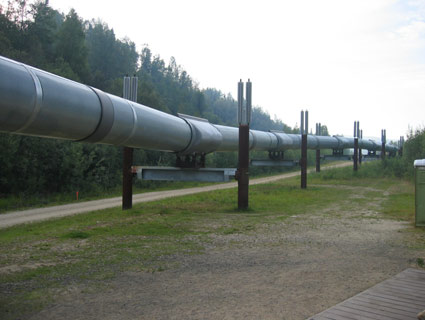TransCanada, the company that is petitioning the US government to build a massive pipeline from Alberta’s tar sands down to refineries in Texas, may have hit a bit of a snag this week as the massive pipeline they already operate in the US dumped 21,000 gallons (500 barrels) of crude in North Dakota. The oil the pipeline was carrying, diluted bitumen, is fresh from the tar sands.
From the Wall Street Journal:
The spill occurred early Saturday morning, resulting from a valve failure at a pump station about 40 miles southwest of Milner, N.D. The spill was contained on TransCanada’s property, and two dozen workers have been able to clean up 300 barrels so far, company spokesman Terry Cunha said on Monday.
The pipeline in question stretches from Alberta, Canada into Oklahoma and Illinois, carrying 591,000 barrels of crude a day. It opened in June of last year, but as the Michigan Messenger points out, this is already its 12th leak. Not a great start, to say the least. As Anthony Smith of the Natural Resources Defense Council writes:
Considering that Keystone has been in operation for less than a year and it was predicted to spill no more than once every seven years, this is yet another troubling indicator that U.S. safety regulations intended for pipelines moving conventional oil may not be sufficient for pipelines moving diluted bitumen. And the Keystone pipeline is not going to get any stronger or safer than it is now, as many of the risks associated with hot, high pressure diluted bitumen pipelines—including internal corrosion, abrasion and stress corrosion cracking—only weaken pipelines over time.
But TransCanada’s spokesman insists this is not a big deal—the pipeline itself isn’t leaking, only its stations. “The system is working as it should,” Cunha told the WSJ. “We built the system to the best of our ability to ensure these things don’t happen, but when they do we respond immediately, and we were able to shut down the system within minutes.”
Of course, the company has every reason to downplay the problems. The State Department is currently deciding whether to allow the company to build a 1,661-mile extension for the pipeline, a $12 billion project. The plan has drawn criticism from property owners, ranchers, farmers, environmentalists and some local politicians for the impact a potential spill could have on land and water resources in the region. I’m guessing the latest incident doesn’t help TransCanada’s case very much.













